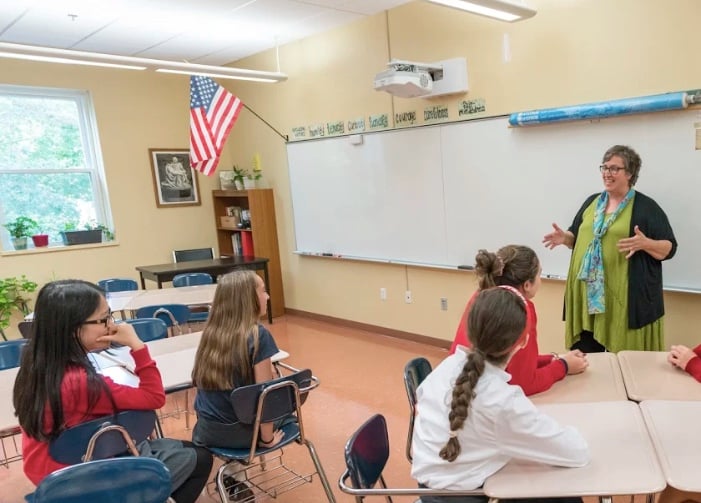When parents look at Montrose School’s reading lists in the humanities, they immediately notice that our students encounter truly challenging texts. At the moment, students in 9th grade are finishing Charles Dickens’ Great Expectations in English and nearing the end of Homer’s Odyssey in history.
Those are hefty books for 14-year-olds beginning high school. I wish I could put a lens on our discussions to help you see these students’ journeys through these epics. The energy is high, the emotions are passionate, and they are developing deep reading and critical thinking skills as they analyze these texts.
We aren’t simply “covering” the material as a task to complete; we are probing essential questions such as:
- What does a person need to develop moral courage?
- How does reflecting on experience help us refine our moral identity?
- How does envy subvert empathy and suffering awaken empathy?
- How are good leaders formed through stress tests of character?
As students explore complexity in character development, they come to see beyond simplistic paradigms and to discover the rich beauty of human nature amidst mucky circumstances and choices. Their confidence has soared through this brain-developing process. And the school year is still young.
The Brain-Training Work
Cognitive neuroscientist Dr. Maryanne Wolf’s ground-breaking work on how humans developed the complex ability to read remains my favorite non-fiction text of all-time: Proust and the Squid: The Story of the Reading Brain. The magic of neuroplasticity and brain development is a captivating story, and its implications are vital for the individual learner and for the health of our democracy.
Wolf zeroes in on the most important stage of reading development: the shift from decoding to automatization. At the decoding stage, readers are limited to figuring out what the author is saying. At the automatic -- or “deep reading” stage -- skilled readers “think new thoughts and add whole new experiences and feelings.” A deep reader can go far beyond understanding what she reads; she can develop diverse perspectives, make inferences, draw analogies, form critical insights, and synthesize ideas from multi-variable sources. She can even invent new ideas.
Wolf goes on to say that our democracy depends on reading fluency because decoders are stuck following what others say while deep readers develop the capacity to think independently.
Developing deep readers is our passion at Montrose. While many schools have responded to declining reading levels by assigning less challenging texts at a slower pace, we have taken a different approach. We keep both the quality and volume high and teach students how to engage with complex vocabulary, sentence structure, details, symbolism, and themes.
Our work reflects the compelling research on the efficacy of closely reading challenging texts. Research out of Stanford University looked at the brains of people as they read Jane Austen -- first skimming and then reading closely. When students engaged in close reading, they had “a dramatic and unexpected increase in blood flow to regions of the brain beyond those responsible for "executive function" revealing that "cognition is shaped not just by what we read, but how we read it."
And, at Montrose, we read in print because the research is incontrovertible that reading on paper strengthens comprehension and fluency while reading in digital media adds to brain scatter and undermines comprehension. Wolf’s more recent book, Reader Come Home: The Reading Brain in a Digital World, provides a complete analysis of the dangers and implications of digital reading.
The Heart-Tugging Work
Just as reading strengthens our brains, stories also strengthen our hearts and help us connect with others. Research reveals that telling and listening to someone’s story releases the hormone oxytocin that helps us bond with others. In this holiday season, take another look at Dr. Karen Bohlin’s article on The Power of a Family Story on the LifeCompass Institute Blog. Also check out Arthur C. Brooks’ recent book Love your Enemies: How Decent People can save America from a Culture of Contempt, which my 11th grade AP Language & Composition students recently read as they brainstormed guidelines for how to develop a more civil civic culture in America. Brooks documents research about telling stories as one factor that can heal the political divide. The students are thrilled that he will speak at the school this January.
The stories of characters in literature expand students’ emotional growth and understanding of our shared humanity. In 9th grade English, students brim with empathy for the young Pip who is raised with a broken and abusive sister and her loving but morally timid husband. Pip said that his upbringing made him “sensitive” and “indecisive.” It also left him vulnerable to the malevolent influences of Miss Havisham and her puppet daughter, who further diminish Pip’s confidence and entice his envy. As his envy grows, he completely hurts those who have cared for him most. However, as he suffers more, Pip re-develops empathy for others, and he learns to practice magnanimity. As we’ve traveled along with Pip, the students have adored, hated, and come to empathize with him.
Likewise, they’ve watched the young Telemachus in Homer’s Odyssey transform from a whiny adolescent to an empowered protagonist. Over a recent weekend, some students teared up as they saw a father and son, who have never met, united after 20 years of painful separation.
The experience of my 9th graders is a small taste of the full sweep of a Montrose education in deep reading and effective communication. The challenging reading that they’ve conquered already has helped them grow in confidence as readers while also building more secure neural pathways. They are forming the habits of strong readers, and this prepares them intellectually and emotionally to become engaged citizens and innovative leaders.






